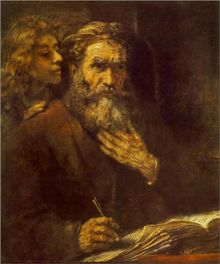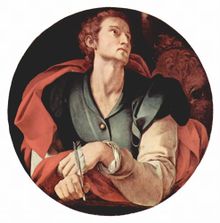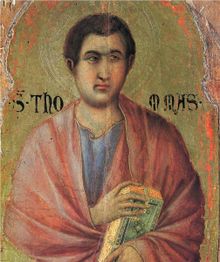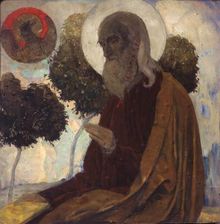Difference between revisions of "Introduction to the New Testament (2016 Boccaccini), course"
(Created page with "thumb|250px|Portrait of [[James, the brother of Jesus]] thumb|250px|Portrait of [[Peter (Reni, 1600)]] File:Paul Mosaic Rav...") |
|||
| Line 44: | Line 44: | ||
==General Introduction== | ==General Introduction== | ||
(1) Wed Jan | (1) Wed Jan 6, 2016 – General Introduction. What is the [[New Testament]]? (I) | ||
*Website: the [[New Testament]] | *Website: the [[New Testament]] | ||
(2) Fri Jan | (2) Fri Jan 8, 2016 – What is the [[New Testament]]? (II) | ||
Do We Have the Original New Testament? | Do We Have the Original New Testament? | ||
*Religious tolerance: [https://archive.org/details/THE_HOUSE_I_LIVE_IN A message from 1945] | *Religious tolerance: [https://archive.org/details/THE_HOUSE_I_LIVE_IN A message from 1945] | ||
| Line 53: | Line 53: | ||
*Website: the [[New Testament]] | *Website: the [[New Testament]] | ||
====Part 1 – From | ====Part 1 – The Beginnings of The Church: From a Palestinian Movement to a Missionary Religion==== | ||
(3) Mon Jan | (3) Mon Jan 11, 2016 – The Founder of Christianity, [[Jesus of Nazareth]] | ||
*Documentary: “From Jesus to Christ” (I) [Frontline, PBS 1998] | *Documentary: “From Jesus to Christ” (I) [Frontline, PBS 1998] | ||
*Text-Book: “The Historical Jesus: Sources, Problems, and Methods” | *Text-Book: “The Historical Jesus: Sources, Problems, and Methods” | ||
*Website: [[Jesus of Nazareth]] | *Website: [[Jesus of Nazareth]] | ||
(4) Wed Jan | (4) Wed Jan 13, 2016 - The Beginnings of the Church at Jerusalem. -- The First Leaders: The family and the Disciples; [[James]], [[Peter]], and [[John]] -- The Earliest Christian Message (I): The end of this evil world and the imminent coming of the Kingdom of God | ||
The First Leaders: The family and the Disciples; [[James]], [[Peter]], and [[John]] | |||
*Reading: [[Acts of the Apostles]] chs. 1-3 | *Reading: [[Acts of the Apostles]] chs. 1-3 | ||
*Website: [[Gathering of the Twelve at Jerusalem]], [[Christian Pentecost]], [[Sharing of Goods]] | *Website: [[Gathering of the Twelve at Jerusalem]], [[Christian Pentecost]], [[Sharing of Goods]] | ||
*Text-Book: “The Acts of the Apostles” | *Text-Book: “The Acts of the Apostles” | ||
(5) Fri Jan 15, 2016 | |||
The Earliest Christian Message (II): Jesus is the Messiah and the Forgiver of sins. -- The relations with the other Jewish groups (Pharisees and Sadducees) and the diversity of early Church (Hebrews and Hellenists) -- Christianity as a Jewish Messianic Movement. | |||
The Earliest Christian Message (II): Jesus is the Messiah and the Forgiver of sins. | |||
Christianity as a Jewish Messianic Movement. | |||
*Reading: [[Acts of the Apostles]] 4-7 | *Reading: [[Acts of the Apostles]] 4-7 | ||
*Website: [[Choice of the Seven]], [[Martyrdom of Stephen]] | *Website: [[Choice of the Seven]], [[Martyrdom of Stephen]] | ||
*Text-Book: “The Acts of the Apostles” | *Text-Book: “The Acts of the Apostles” | ||
[ Mon Jan | [ Mon Jan 18, 2016 – Martin Luther King Jr. Day (no class) ] | ||
(6) Wed Jan | (6) Wed Jan 20, 2016 - The first Baptism of Gentiles. Peter and Cornelius | ||
*Reading: [[Acts of the Apostles]] 9-12 | *Reading: [[Acts of the Apostles]] 9-12 | ||
*Website: [[Spread of the Gospel to Samaria]], [[Baptism of the Eunuch]] & [[Conversion of Cornelius]] | *Website: [[Spread of the Gospel to Samaria]], [[Baptism of the Eunuch]] & [[Conversion of Cornelius]] | ||
*Text-Book: “The Acts of the Apostles” | *Text-Book: “The Acts of the Apostles” | ||
(7) Fri Jan 22, 2016 – After the Death of Jesus. The Traditions of Jesus in Their Greco-Roman Context. | |||
(7) Fri Jan | |||
*Documentary: “From Jesus to Christ” (II) [Frontline, PBS 1998] | *Documentary: “From Jesus to Christ” (II) [Frontline, PBS 1998] | ||
*Text-Book: “The World of Early Christian Traditions”; and “The Traditions of Jesus in Their Greco-Roman Context”. | *Text-Book: “The World of Early Christian Traditions”; and “The Traditions of Jesus in Their Greco-Roman Context”. | ||
(8) Mon Jan | (8) Mon Jan 25, 2016 – Paul: His "conversion" and First Missionary Journey with [[Barnabas]] | ||
The Challenges of the Hellenistic Environment | The Challenges of the Hellenistic Environment | ||
From Jerusalem to Asia Minor and Greece (Acts of Apostles 13-19) | From Jerusalem to Asia Minor and Greece (Acts of Apostles 13-19) | ||
| Line 98: | Line 88: | ||
*Website: [[Paul's First Missionary Journey]] | *Website: [[Paul's First Missionary Journey]] | ||
(9) Wed Jan 27, 2016 - [[Paul's Second Missionary Journey]] | |||
*Reading: [[Acts of Apostles]] (15:30--18:21) | *Reading: [[Acts of Apostles]] (15:30--18:21) | ||
*Website: [[Paul's Second Missionary Journey]] | *Website: [[Paul's Second Missionary Journey]] | ||
( | ====Part 2: The Teaching of Paul==== | ||
(10) Fri Jan 29, 2016 – [[First Letter of Paul to the Thessalonians]]. | |||
Pagans, God--fearers, Hellenistic Jews -- Christ the lord and His Second Coming. | |||
*Website: [[1 Thessalonians]] | *Website: [[1 Thessalonians]] | ||
*Reading: [[1 Thessalonians]] -- Text-Book: “1 Thessalonians” | *Reading: [[1 Thessalonians]] -- Text-Book: “1 Thessalonians” | ||
(-- | (11) Mon Feb 1, 2016 -- [[First Letter of Paul to the Corinthians]]. | ||
A Crisis in the Church. Moral Teachings. -- Idolatry --Jewish Monotheism vs. Polytheism | |||
*Website: [[1 Corinthians]] | |||
*Reading: 1 Corinthians -- Text-Book: “1 Corinthians” | |||
(-- | (12) Wed Feb 3, 2016 –- Paul’s Christology: [[Letter to Philippians]]. -- Jesus, the Obedient Adam. | ||
*Website: [[Christology]] | |||
*Reading: [[Philippians]] | |||
*Text-Book: “Philippians” | |||
< First Mid-Term (Fri Feb 5, 2016) during discussion sessions > | |||
(13) Fri Feb 5, 2016 –- [[Second Letter of Paul to the Corinthians]] -- Against sexual immorality | |||
(13) Fri Feb | |||
*Website: [[2 Corinthians]] | *Website: [[2 Corinthians]] | ||
*Reading: 2 Corinthians -- Text-Book: “2 Corinthians” | *Reading: 2 Corinthians -- Text-Book: “2 Corinthians” | ||
(14) Mon Feb 8, 2016 -- Paul’s Social Message: [[Letter to Philemon]] -- The Problem of slavery and social injustice. | |||
*Website: see [[Onesimus]], and [[Slavery]] | |||
*Reading: Philemon | |||
*Text-Book: “Philemon” | |||
(15) Wed Feb 10, 2016 –- jews and Gentiles in the Church -- The Council of Jerusalem -- Christ and the Jewish Law -- Paul’s [[Letter to the Galatians]]. | |||
( | |||
Paul’s [[Letter to the Galatians]] | |||
*Website: [[Galatians]], [[Council of Jerusalem]], [[Incident at Antioch]] | *Website: [[Galatians]], [[Council of Jerusalem]], [[Incident at Antioch]] | ||
*Reading: Galatians | *Reading: Galatians | ||
*Text-Book: “Galatians” | *Text-Book: “Galatians” | ||
( | (16) Fri Feb 12, 2016 – Paul’s [[Letter to the Romans]] (I): | ||
The three Ways of Salvation of Paul the Jew | |||
*Reading: Romans | *Reading: Romans | ||
*Text-Book: “The Gospel According to Paul” | *Text-Book: “The Gospel According to Paul” | ||
( | (17) Mon Feb 15, 2016 – Paul’s [[Letter to the Romans]] (II): | ||
Forgiveness by Faith, Salvation by Works. | |||
*Reading: Romans | *Reading: Romans | ||
*Text-Book: “The Gospel According to Paul” | *Text-Book: “The Gospel According to Paul” | ||
( | (18) Wed Feb 17, 2016 –The [[Letter of James]]. | ||
Forgiveness by Works, not by Faith only. | |||
*Website: see [[James]] | *Website: see [[James]] | ||
*Reading: Letter of James. | *Reading: Letter of James. | ||
*Text-Book: “The Epistle of James”; and “Paul and James”. | *Text-Book: “The Epistle of James”; and “Paul and James”. | ||
( | (19) Fri Feb 19, 2016 – The [[First Letter of Peter]]. | ||
The Role of Mediation of the Head of the Twelve. | The Role of Mediation of the Head of the Twelve. | ||
*Website: see [[Peter]] | *Website: see [[Peter]] | ||
| Line 160: | Line 147: | ||
*Text-Book: “The Letter of 1 Peter” | *Text-Book: “The Letter of 1 Peter” | ||
( | (20) Mon Feb 22, 2016 – The Gospel of Mark | ||
Jesus, the [[Son of God]] and the [[Son of Man]]. | |||
The Apocalyptic Messiah and the Eschatological Judge. | |||
*Reading: The [[Gospel of Mark]] | |||
*Text-Book: “The Gospel According to Mark” & “Jesus, the Apocalyptic Prophet” | |||
(21) Wed Feb 24, 2016 – Paul' Last Visit to Jerusalem: His arrest | |||
*Reading: [[Acts of Apostles]] (21:15--23:10) | *Reading: [[Acts of Apostles]] (21:15--23:10) | ||
*Website: [[Paul's Last Visit to Jerusalem]] | *Website: [[Paul's Last Visit to Jerusalem]] | ||
( | (22) Fri Feb 26, 2016: Paul’s in Caesarea and His Last Journey to Rome. | ||
* Reading: [[Acts of Apostles]] (Acts 24-28). | * Reading: [[Acts of Apostles]] (Acts 24-28). | ||
*Website: [[Paul in Caesarea]] & [[Paul's Journey to Rome]] | *Website: [[Paul in Caesarea]] & [[Paul's Journey to Rome]] | ||
*Reading: [[Acts of the Apostles]] | *Reading: [[Acts of the Apostles]] | ||
[ Mar | [ Feb 28 - Mar 6, 2016 – Winter Recess, No classes ] | ||
====Part 3 – From the Destruction of the Temple to the End of the First Century (70-100 CE)==== | |||
(23) Mon Mar | (23) Mon Mar 7, 2016 – After the Destruction of the Jerusalem Temple | ||
*Documentary: “From Jesus to Christ” (III) [Frontline, PBS 1998] | *Documentary: “From Jesus to Christ” (III) [Frontline, PBS 1998] | ||
(24) Wed Mar 9, 2016 –– 2nd Midterm (in lecture class)] | |||
(25) Fri Mar | (25) Fri Mar 11, 2016 -- The [[Gospel of Matthew]] and the [[Gospel of Luke]] | ||
The Jewish Messiah: Jesus, the [[Son of Man]], the [[Son of David]], the new Moses. | The Jewish Messiah: Jesus, the [[Son of Man]], the [[Son of David]], the new Moses. | ||
*Reading & Website: [[Gospel of Matthew]] | *Reading & Website: [[Gospel of Matthew]] | ||
| Line 200: | Line 179: | ||
*Text-Book: “The Gospel According to Luke” | *Text-Book: “The Gospel According to Luke” | ||
(26) Mon Mar 14, 2016 -- The Letter to the Hebrews. | |||
(26) Mon Mar | |||
The Son of Man is Far Above the Angels. | The Son of Man is Far Above the Angels. | ||
*Reading & Website: [[Hebrews]], [[Gods & Demigods]], [[Priesthood]], [[Melchizedek]] | *Reading & Website: [[Hebrews]], [[Gods & Demigods]], [[Priesthood]], [[Melchizedek]] | ||
*Text-Book: “The Epistle to the Hebrews” | *Text-Book: “The Epistle to the Hebrews” | ||
(27) Wed Mar 16, 2016 -- Continuing the Tradition of Paul. | |||
2 Thessalonians – Colossians – Ephesians. | 2 Thessalonians – Colossians – Ephesians. | ||
The Delay of the End and the Divinity of the Son. | The Delay of the End and the Divinity of the Son. | ||
| Line 216: | Line 191: | ||
*Text-Book: “In the Wake of the Apostle” | *Text-Book: “In the Wake of the Apostle” | ||
( | (28) Fri Mar 18, 2016 – – The Letter of Barnabas. | ||
An Anti-Jewish Christianity? The Theology of Supersession. | An Anti-Jewish Christianity? The Theology of Supersession. | ||
The Rise of Christian Anti-Seminitism. | The Rise of Christian Anti-Seminitism. | ||
| Line 223: | Line 198: | ||
*Text-Book: “The Epistle of Barnabas and Melito’s Passover Sermon” (ch 25 pp 418-425) | *Text-Book: “The Epistle of Barnabas and Melito’s Passover Sermon” (ch 25 pp 418-425) | ||
( | (29) Mon Mar 21, 2016 – The Gospel of Thomas. | ||
A non-Jewish Christianity? The Challenge of Gnosticism. | A non-Jewish Christianity? The Challenge of Gnosticism. | ||
*Reading & Website: [[Gospel of Thomas]] | *Reading & Website: [[Gospel of Thomas]] | ||
*Text-Book: “The Gospel of Thomas” (ch 12 pp 201-207) | *Text-Book: “The Gospel of Thomas” (ch 12 pp 201-207) | ||
( | (30) Wed Mar 23, 2016 –- The Gospel of John (I): | ||
The Divinity of the Christ-Logos | The Divinity of the Christ-Logos | ||
*Reading & Website: [[Gospel of John]] | *Reading & Website: [[Gospel of John]] | ||
*Text-Book: “The Gospel According to John” | *Text-Book: “The Gospel According to John” | ||
( | (--) Thu Mar 24, 2016 -- Special class: Lecture by Jodi Magness on the Dead Sea Scrolls | ||
[ Fri Mar 25, 2015 – Passover / Good Friday (no class) ] | |||
(31) Mon Mar 28, 2015 – The Gospel of John (II): | |||
The role of the Holy Spirit in a Charismatic community | The role of the Holy Spirit in a Charismatic community | ||
*Reading & Website: [[Gospel of John]] | *Reading & Website: [[Gospel of John]] | ||
*Text-Book: “The Gospel According to John” | *Text-Book: “The Gospel According to John” | ||
====Part | ====Part 4 – Structuring the Church; or, The Early Second Century (100-150 CE)==== | ||
( | (32) Wed Mar 30, 2016 – Continuing the Tradition of John (I): | ||
1, 2 &3 John, and the Letters to the Seven Churches in Revelation. | 1, 2 &3 John, and the Letters to the Seven Churches in Revelation. | ||
*Reading: 1, 2, & 3 John; and Revelation | *Reading: 1, 2, & 3 John; and Revelation | ||
| Line 246: | Line 225: | ||
*Text-Book: “The Johannine Epistles’ and Beyond” | *Text-Book: “The Johannine Epistles’ and Beyond” | ||
(33) Fri Apr 1, 2016 – Continuing the Tradition of John (I): | |||
1, 2 &3 John, and the Letters to the Seven Churches in Revelation. | |||
*Reading: 1, 2, & 3 John; and Revelation | |||
*Website: [[Letters of John]] and [[Seven Churches]] | |||
*Text-Book: “The Johannine Epistles’ and Beyond” | |||
(34) Mon Apr | (34) Mon Apr 4, 2016 – Continuing the Tradition of John (II): | ||
The Apocalyptic message of the [[Book of Revelation]]./ | The Apocalyptic message of the [[Book of Revelation]]./ | ||
*Reading: Revelation (chs 4-22) | *Reading: Revelation (chs 4-22) | ||
*Text-Book: “The Revelation of John” | *Text-Book: “The Revelation of John” | ||
(35) Wed Apr | (35) Wed Apr 6, 2016 – Continuing the Tradition of James (I): The [[Letter of Jude]] – The [[Didache]]. | ||
*Reading: Jude, and the Didache | *Reading: Jude, and the Didache | ||
*Text-Book: “Jude,” and “The Didache” | *Text-Book: “Jude,” and “The Didache” | ||
(36) Fri Apr | (36) Fri Apr 8, 2016 – Continuing the Tradition of James (II) | ||
The Jewish-Christian Gospels ([[Gospel of the Nazarenes]]; [[Gospel of the Ebionites]]; [[Gospel of the Hebrews]]) - The [[Shepherd of Hermas]] | The Jewish-Christian Gospels ([[Gospel of the Nazarenes]]; [[Gospel of the Ebionites]]; [[Gospel of the Hebrews]]) - The [[Shepherd of Hermas]] | ||
*Reading: Jewish-Christian Gospels; and the [[Shepherd of Hermas]]; see also [[Persecution of Christians]] | *Reading: Jewish-Christian Gospels; and the [[Shepherd of Hermas]]; see also [[Persecution of Christians]] | ||
*Text-Book: “The Jewish-Christian Gospels”; and “The Shepherd of Hermas” | *Text-Book: “The Jewish-Christian Gospels”; and “The Shepherd of Hermas” | ||
(37) Mon Apr 13, | (37) Mon Apr 13, 2016 – Continuing the Tradition of Peter | ||
The [[Second Letter of Peter]] – The [[Gospel of Peter]] – The [[Apocalypse of Peter]] | The [[Second Letter of Peter]] – The [[Gospel of Peter]] – The [[Apocalypse of Peter]] | ||
*Reading: [[2 Peter]]; the [[Gospel of Peter]]; and the [[Apocalypse of Peter]] | *Reading: [[2 Peter]]; the [[Gospel of Peter]]; and the [[Apocalypse of Peter]] | ||
*Text-Book: “2 Peter”; “The Gospel of Peter”; and “The Apocalypse of Peter” | *Text-Book: “2 Peter”; “The Gospel of Peter”; and “The Apocalypse of Peter” | ||
(38) | (38) Mon Apr 11, 2016 – Continuing the Tradition of Paul (I): | ||
The Persecution of the Early Christians - The Authority of the Bishop in the Church. | The Persecution of the Early Christians - The Authority of the Bishop in the Church. | ||
The Seven [[Letters of Ignatius]] (Ephesians; Magnesians; Trallians; Romans; Philadelphias; Smyrneans; Polycarp) – The [[Letter of Polycarp]] to the Philippians – The [[Martyrdom of Polycarp]]; The Epistle of Clement. | The Seven [[Letters of Ignatius]] (Ephesians; Magnesians; Trallians; Romans; Philadelphias; Smyrneans; Polycarp) – The [[Letter of Polycarp]] to the Philippians – The [[Martyrdom of Polycarp]]; The Epistle of Clement. | ||
| Line 275: | Line 258: | ||
*[https://www.youtube.com/watch?v=SlYHIGpsLyU History of Chrsitianity 2 (an "orthodox" apologetic view)] | *[https://www.youtube.com/watch?v=SlYHIGpsLyU History of Chrsitianity 2 (an "orthodox" apologetic view)] | ||
(39) | (39) Wed Apr 13, 2016 – Continuing the Tradition of Paul (II): | ||
Strengthening the Authority of the Bishop - Downplaying the Role of Women. | Strengthening the Authority of the Bishop - Downplaying the Role of Women. | ||
The Pastoral Epistles of Paul: [[1 Timothy]] & [[2 Timothy]] (NT), [[Letter of Paul to Titus]] (NT). | The Pastoral Epistles of Paul: [[1 Timothy]] & [[2 Timothy]] (NT), [[Letter of Paul to Titus]] (NT). | ||
| Line 285: | Line 268: | ||
*[https://www.youtube.com/watch?v=aBg-UBJY7MA Should Women be in Church leadership positions?] | *[https://www.youtube.com/watch?v=aBg-UBJY7MA Should Women be in Church leadership positions?] | ||
(40) Fri Apr 15, 2016 - Modern fictional accounts of the life of the first Christians | |||
*(a) Expansions of stories in the New Testament | |||
*(b) New stories; Quo Vadis, The Last Days of Pompeii, The Silver Chalice, e | |||
(a) Expansions of stories in the New Testament | |||
(b) New stories; Quo Vadis, The Last Days of Pompeii, The Silver Chalice, e | |||
(41) Mon Apr 18, 2016 – After the New Testament. | |||
( | |||
Summary and Conclusion. | Summary and Conclusion. | ||
| Line 320: | Line 300: | ||
* F (69% or less) | * F (69% or less) | ||
The first midterm exams (10% of the final grade) is a series of 50 questions about the contents of the first | The first midterm exams (10% of the final grade) is a series of 50 questions about the contents of the first 9 lectures of the course . It is aimed to be a sort of preparation to the more important second mid-term and final exams. If your grade is F, you must submit a written petition (by e-mail) to the Professor and receive written permission (by e-mail) to continue the class, provided that your attendance is good. If you need or want to improve your grade, you may retake your exam, following the instructions below (f). | ||
The second midterm exam (20% of the final grade) is a series of 100 questions (80 new questions about the contents of the second part of the course (i.e. lectures | The second midterm exam (20% of the final grade) is a series of 100 questions (80 new questions about the contents of the second part of the course (i.e. lectures 10-22), plus 20 questions from the first midterm). No re-taking will be allowed, and no curve will be granted, under any circumstance. If your grade is F, you must submit a written petition (by e-mail) to your GSI and receive written permission (by e-mail) to continue the class, provided that your attendance is good. If you need or want to improve your grade, just followed the instructions below (f). | ||
(d) As a written assignment (20% of your final grade), you have to pick up a scholarly book or a novel or play focusing on Paul of Tarsus or any of Apostles in the period after the death of Jesus (your choice must be pre-approved by your GSI) and write (by Apr 5, | (d) As a written assignment (20% of your final grade), you have to pick up a scholarly book or a novel or play focusing on Paul of Tarsus or any of Apostles in the period after the death of Jesus (your choice must be pre-approved by your GSI) and write (by Apr 5, 2016) a (400-500 word) synopsis of its content, and a 1 or 2 page commentary on the use that book or novel or play made of NT sources and on the interpretation given to the events as compared to the presentation offered in the course, | ||
*A+ = 99% / A = 95% / A- = 91% | *A+ = 99% / A = 95% / A- = 91% | ||
| Line 331: | Line 311: | ||
*D+ = 73% / D = 72% / D- = 70% | *D+ = 73% / D = 72% / D- = 70% | ||
Papers will be presented orally during discussion sessions (5-10m each) or during lectures. | |||
The best summaries will be posted online in “4 Enoch: The Online Encyclopedia of Second Temple Judaism” <www.4enoch.org> under your name. | The best summaries will be posted online in “4 Enoch: The Online Encyclopedia of Second Temple Judaism” <www.4enoch.org> under your name. | ||
(e) The final exam (40% of the final grade) is a series of 150 multiple-choice questions aimed at a general review of the entire course: 100 new questions about the contents of all | (e) The final exam (40% of the final grade) is a series of 150 multiple-choice questions aimed at a general review of the entire course: 100 new questions about the contents of all four parts of the course (but with special emphasis on the third and four parts), plus 50 questions from the first two exams (15+35, respectively). The grading system will follow the same criteria as the midterm exams. | ||
(f) [Optional] The Instructor’s goal is to help the deserving students, who may have some initial difficulties, to improve their grade. You may choose to retake your first and/or second exam. The questions will be the same, except for 5 new questions (in the first exam) or 10 new questions (in the second exam). Depending on your new grade, you will have an increase up to 8 points (if you get an A+), 6 points (A), 4 points (A-) or 2 points (B+) points (0 if you get B or less) on the grade of your exam. In no case your percentage can overcame 87%. No retake is allowed for the final exam. | (f) [Optional] The Instructor’s goal is to help the deserving students, who may have some initial difficulties, to improve their grade. You may choose to retake your first and/or second exam. The questions will be the same, except for 5 new questions (in the first exam) or 10 new questions (in the second exam). Depending on your new grade, you will have an increase up to 8 points (if you get an A+), 6 points (A), 4 points (A-) or 2 points (B+) points (0 if you get B or less) on the grade of your exam. In no case your percentage can overcame 87%. No retake is allowed for the final exam. | ||
Revision as of 17:01, 3 January 2016
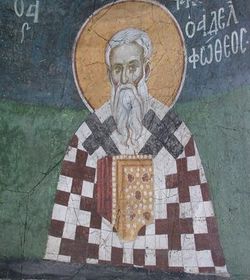
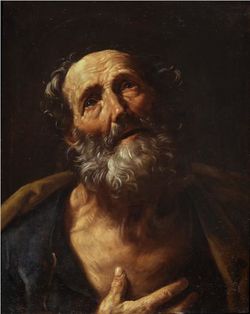
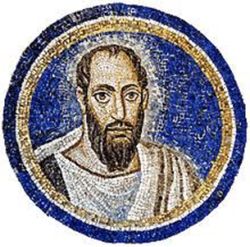

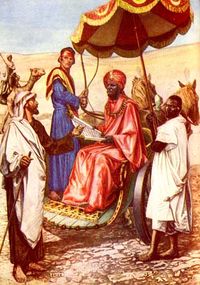
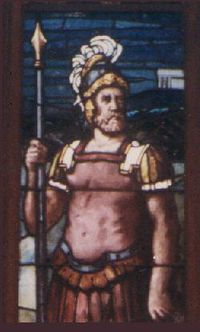
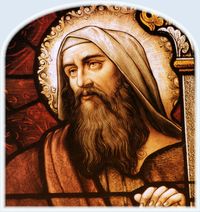
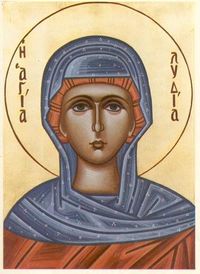
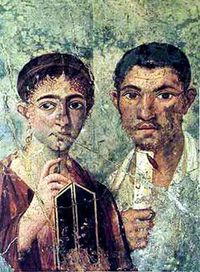
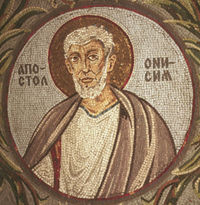
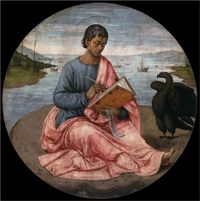
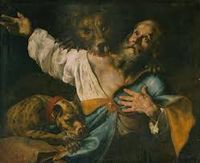
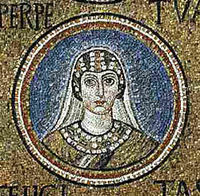
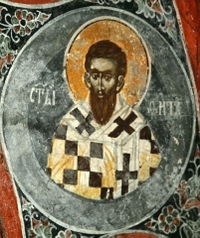
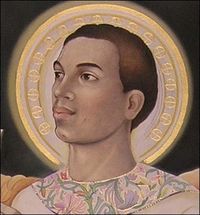
Introduction to the New Testament is a course offered by Gabriele Boccaccini at the University of Michigan in the Winter 2015.
Description
The course offers an Introduction to the Early Christian Literature and the development of the Early Christian movement from the death of Jesus of Nazareth until the mid-2nd Century.
The approach is historical and chronological and no distinction is made between "canonical" and non-canonical" literature. The New Testament documents are studied alongside with the writings of the Apostolic Fathers and the New Testament Apocrypha, The development of the early Church is illustrated in the diversity of its components.
Christianity is presented originally as a Jewish messianic movement which grew up out of the diverse world of Second Temple Judaism to gradually parting, after the destruction of Jerusalem in the year 70, from the other major Jewish movements of the time--Hellenistic Judaism and the nascent Rabbinic movement.
Syllabus
- Meeting Place: Aud C (Angell Hall)
- Readings: The New Testament" (New Revised Standard Version of the Bible), and the "Apostolic Fathers" (texts are available online). If you like to purchase a printed copy: The New Testament and Other Early Christian Writings: A Reader by Bart D. Ehrman (2003), or The Holy Bible: New Revised Standard Version with Apocrypha by Bruce M. Metzger (1991) (available at www.amazon.com)
- Text-Book: The New Testament: A Historical Introduction to the Early Christian Writings, by Bart D. Ehrman, 4th (2007) or 5th (2011) editions (available at www.amazon.com)
- GSIs: Vahe Sahakyan and Michail Kitsos
General Introduction
(1) Wed Jan 6, 2016 – General Introduction. What is the New Testament? (I)
- Website: the New Testament
(2) Fri Jan 8, 2016 – What is the New Testament? (II) Do We Have the Original New Testament?
- Religious tolerance: A message from 1945
- Text-Book: “What Is the New Testament”; and “Do We Have the Original New Testament”
- Website: the New Testament
Part 1 – The Beginnings of The Church: From a Palestinian Movement to a Missionary Religion
(3) Mon Jan 11, 2016 – The Founder of Christianity, Jesus of Nazareth
- Documentary: “From Jesus to Christ” (I) [Frontline, PBS 1998]
- Text-Book: “The Historical Jesus: Sources, Problems, and Methods”
- Website: Jesus of Nazareth
(4) Wed Jan 13, 2016 - The Beginnings of the Church at Jerusalem. -- The First Leaders: The family and the Disciples; James, Peter, and John -- The Earliest Christian Message (I): The end of this evil world and the imminent coming of the Kingdom of God
- Reading: Acts of the Apostles chs. 1-3
- Website: Gathering of the Twelve at Jerusalem, Christian Pentecost, Sharing of Goods
- Text-Book: “The Acts of the Apostles”
(5) Fri Jan 15, 2016 The Earliest Christian Message (II): Jesus is the Messiah and the Forgiver of sins. -- The relations with the other Jewish groups (Pharisees and Sadducees) and the diversity of early Church (Hebrews and Hellenists) -- Christianity as a Jewish Messianic Movement.
- Reading: Acts of the Apostles 4-7
- Website: Choice of the Seven, Martyrdom of Stephen
- Text-Book: “The Acts of the Apostles”
[ Mon Jan 18, 2016 – Martin Luther King Jr. Day (no class) ]
(6) Wed Jan 20, 2016 - The first Baptism of Gentiles. Peter and Cornelius
- Reading: Acts of the Apostles 9-12
- Website: Spread of the Gospel to Samaria, Baptism of the Eunuch & Conversion of Cornelius
- Text-Book: “The Acts of the Apostles”
(7) Fri Jan 22, 2016 – After the Death of Jesus. The Traditions of Jesus in Their Greco-Roman Context.
- Documentary: “From Jesus to Christ” (II) [Frontline, PBS 1998]
- Text-Book: “The World of Early Christian Traditions”; and “The Traditions of Jesus in Their Greco-Roman Context”.
(8) Mon Jan 25, 2016 – Paul: His "conversion" and First Missionary Journey with Barnabas The Challenges of the Hellenistic Environment From Jerusalem to Asia Minor and Greece (Acts of Apostles 13-19)
- Reading: Acts of Apostles (13:1--14:28)
- Website: Paul's First Missionary Journey
(9) Wed Jan 27, 2016 - Paul's Second Missionary Journey
- Reading: Acts of Apostles (15:30--18:21)
- Website: Paul's Second Missionary Journey
Part 2: The Teaching of Paul
(10) Fri Jan 29, 2016 – First Letter of Paul to the Thessalonians. Pagans, God--fearers, Hellenistic Jews -- Christ the lord and His Second Coming.
- Website: 1 Thessalonians
- Reading: 1 Thessalonians -- Text-Book: “1 Thessalonians”
(11) Mon Feb 1, 2016 -- First Letter of Paul to the Corinthians. A Crisis in the Church. Moral Teachings. -- Idolatry --Jewish Monotheism vs. Polytheism
- Website: 1 Corinthians
- Reading: 1 Corinthians -- Text-Book: “1 Corinthians”
(12) Wed Feb 3, 2016 –- Paul’s Christology: Letter to Philippians. -- Jesus, the Obedient Adam.
- Website: Christology
- Reading: Philippians
- Text-Book: “Philippians”
< First Mid-Term (Fri Feb 5, 2016) during discussion sessions >
(13) Fri Feb 5, 2016 –- Second Letter of Paul to the Corinthians -- Against sexual immorality
- Website: 2 Corinthians
- Reading: 2 Corinthians -- Text-Book: “2 Corinthians”
(14) Mon Feb 8, 2016 -- Paul’s Social Message: Letter to Philemon -- The Problem of slavery and social injustice.
(15) Wed Feb 10, 2016 –- jews and Gentiles in the Church -- The Council of Jerusalem -- Christ and the Jewish Law -- Paul’s Letter to the Galatians.
- Website: Galatians, Council of Jerusalem, Incident at Antioch
- Reading: Galatians
- Text-Book: “Galatians”
(16) Fri Feb 12, 2016 – Paul’s Letter to the Romans (I): The three Ways of Salvation of Paul the Jew
- Reading: Romans
- Text-Book: “The Gospel According to Paul”
(17) Mon Feb 15, 2016 – Paul’s Letter to the Romans (II): Forgiveness by Faith, Salvation by Works.
- Reading: Romans
- Text-Book: “The Gospel According to Paul”
(18) Wed Feb 17, 2016 –The Letter of James. Forgiveness by Works, not by Faith only.
- Website: see James
- Reading: Letter of James.
- Text-Book: “The Epistle of James”; and “Paul and James”.
(19) Fri Feb 19, 2016 – The First Letter of Peter. The Role of Mediation of the Head of the Twelve.
- Website: see Peter
- Reading: 1 Peter
- Text-Book: “The Letter of 1 Peter”
(20) Mon Feb 22, 2016 – The Gospel of Mark Jesus, the Son of God and the Son of Man. The Apocalyptic Messiah and the Eschatological Judge.
- Reading: The Gospel of Mark
- Text-Book: “The Gospel According to Mark” & “Jesus, the Apocalyptic Prophet”
(21) Wed Feb 24, 2016 – Paul' Last Visit to Jerusalem: His arrest
- Reading: Acts of Apostles (21:15--23:10)
- Website: Paul's Last Visit to Jerusalem
(22) Fri Feb 26, 2016: Paul’s in Caesarea and His Last Journey to Rome.
- Reading: Acts of Apostles (Acts 24-28).
- Website: Paul in Caesarea & Paul's Journey to Rome
- Reading: Acts of the Apostles
[ Feb 28 - Mar 6, 2016 – Winter Recess, No classes ]
Part 3 – From the Destruction of the Temple to the End of the First Century (70-100 CE)
(23) Mon Mar 7, 2016 – After the Destruction of the Jerusalem Temple
- Documentary: “From Jesus to Christ” (III) [Frontline, PBS 1998]
(24) Wed Mar 9, 2016 –– 2nd Midterm (in lecture class)]
(25) Fri Mar 11, 2016 -- The Gospel of Matthew and the Gospel of Luke The Jewish Messiah: Jesus, the Son of Man, the Son of David, the new Moses.
- Reading & Website: Gospel of Matthew
- Text-Book: “The Gospel According to Matthew”
- Reading & Website: Gospel of Luke
- Text-Book: “The Gospel According to Luke”
(26) Mon Mar 14, 2016 -- The Letter to the Hebrews. The Son of Man is Far Above the Angels.
- Reading & Website: Hebrews, Gods & Demigods, Priesthood, Melchizedek
- Text-Book: “The Epistle to the Hebrews”
(27) Wed Mar 16, 2016 -- Continuing the Tradition of Paul. 2 Thessalonians – Colossians – Ephesians. The Delay of the End and the Divinity of the Son. The Deutero-Pauline Epistles (2 Thessalonians; Colossians; Ephesians).
- Reading & Website: 2 Thessalonians; Colossians; Ephesians; see also Wisdom Personified
- Text-Book: “In the Wake of the Apostle”
(28) Fri Mar 18, 2016 – – The Letter of Barnabas. An Anti-Jewish Christianity? The Theology of Supersession. The Rise of Christian Anti-Seminitism.
- Website: see Letter of Barnabas, Barnabas, Bible Code, Antisemitism
- Reading: Letter of Barnabas
- Text-Book: “The Epistle of Barnabas and Melito’s Passover Sermon” (ch 25 pp 418-425)
(29) Mon Mar 21, 2016 – The Gospel of Thomas. A non-Jewish Christianity? The Challenge of Gnosticism.
- Reading & Website: Gospel of Thomas
- Text-Book: “The Gospel of Thomas” (ch 12 pp 201-207)
(30) Wed Mar 23, 2016 –- The Gospel of John (I): The Divinity of the Christ-Logos
- Reading & Website: Gospel of John
- Text-Book: “The Gospel According to John”
(--) Thu Mar 24, 2016 -- Special class: Lecture by Jodi Magness on the Dead Sea Scrolls
[ Fri Mar 25, 2015 – Passover / Good Friday (no class) ]
(31) Mon Mar 28, 2015 – The Gospel of John (II): The role of the Holy Spirit in a Charismatic community
- Reading & Website: Gospel of John
- Text-Book: “The Gospel According to John”
Part 4 – Structuring the Church; or, The Early Second Century (100-150 CE)
(32) Wed Mar 30, 2016 – Continuing the Tradition of John (I): 1, 2 &3 John, and the Letters to the Seven Churches in Revelation.
- Reading: 1, 2, & 3 John; and Revelation
- Website: Letters of John and Seven Churches
- Text-Book: “The Johannine Epistles’ and Beyond”
(33) Fri Apr 1, 2016 – Continuing the Tradition of John (I): 1, 2 &3 John, and the Letters to the Seven Churches in Revelation.
- Reading: 1, 2, & 3 John; and Revelation
- Website: Letters of John and Seven Churches
- Text-Book: “The Johannine Epistles’ and Beyond”
(34) Mon Apr 4, 2016 – Continuing the Tradition of John (II): The Apocalyptic message of the Book of Revelation./
- Reading: Revelation (chs 4-22)
- Text-Book: “The Revelation of John”
(35) Wed Apr 6, 2016 – Continuing the Tradition of James (I): The Letter of Jude – The Didache.
- Reading: Jude, and the Didache
- Text-Book: “Jude,” and “The Didache”
(36) Fri Apr 8, 2016 – Continuing the Tradition of James (II) The Jewish-Christian Gospels (Gospel of the Nazarenes; Gospel of the Ebionites; Gospel of the Hebrews) - The Shepherd of Hermas
- Reading: Jewish-Christian Gospels; and the Shepherd of Hermas; see also Persecution of Christians
- Text-Book: “The Jewish-Christian Gospels”; and “The Shepherd of Hermas”
(37) Mon Apr 13, 2016 – Continuing the Tradition of Peter The Second Letter of Peter – The Gospel of Peter – The Apocalypse of Peter
- Reading: 2 Peter; the Gospel of Peter; and the Apocalypse of Peter
- Text-Book: “2 Peter”; “The Gospel of Peter”; and “The Apocalypse of Peter”
(38) Mon Apr 11, 2016 – Continuing the Tradition of Paul (I): The Persecution of the Early Christians - The Authority of the Bishop in the Church. The Seven Letters of Ignatius (Ephesians; Magnesians; Trallians; Romans; Philadelphias; Smyrneans; Polycarp) – The Letter of Polycarp to the Philippians – The Martyrdom of Polycarp; The Epistle of Clement.
- Reading: Letters of Ignatius; Letter of Polycarp; Martyrdom of Polycarp; 1 Clement; *Text-Book: ‘Christians and Pagans”; “Polycarp’s Letter”; and “1 Clement”
- Ignatius Life (short video)
- From Judaism to Constantine (crash course)
- History of Chrsitianity 2 (an "orthodox" apologetic view)
(39) Wed Apr 13, 2016 – Continuing the Tradition of Paul (II): Strengthening the Authority of the Bishop - Downplaying the Role of Women. The Pastoral Epistles of Paul: 1 Timothy & 2 Timothy (NT), Letter of Paul to Titus (NT).
- Reading: 1& 2 Timothy; Titus; The Acts of Paul and Thecla
- Text-Book: “The Pastoral Epistles”; “Paul and Thecla”; and “The Oppression of Women”
- John MacArthur - I do not Allow a Woman to Teach... (1Timothy 2:12-15)
- Greg Boyd - Women in Leadership/Ministry
- Debate - Women Preachers
- Should Women be in Church leadership positions?
(40) Fri Apr 15, 2016 - Modern fictional accounts of the life of the first Christians
- (a) Expansions of stories in the New Testament
- (b) New stories; Quo Vadis, The Last Days of Pompeii, The Silver Chalice, e
(41) Mon Apr 18, 2016 – After the New Testament. Summary and Conclusion.
Final Exam - TBA
Grading System and Requirements
[Read this section of the syllabus very carefully. The syllabus is like a contract between the student and the instructors, which we are all bound to respect.]
ATTENDANCE: The course is based on lectures, weekly discussion session, three written exams, and one paper. Regular attendance is mandatory. If you happen to miss a session, it is your responsibility to ask the Professor or the GSI or a class-mate for information about what was discussed in class. Students whose attendance is poor (that is, have missed 6-10 total classes, either lectures or discussion sessions, without justification) will see their final grade reduced by six percentage points. Students who do not attend the class regularly (that is, have missed more than 10 classes, either lectures or discussion sessions, without justification), or do not fulfill each and all the requirements of the course, will not be graded and will receive a NR report.
GRADING SYSTEM: The final grade is based on five elements (of which the last one is optional): (a) Participation: 10% -- (b) First Midterm: 10% -- (c) Second Midterm: 20% -- (d) Paper 20% – (e) Final exam: 40% -- (f) Re-taking of the first & second Exam (optional): possible increase
(a) Quality of participation in class and discussion sessions makes 10% of the final grade. The evaluation will be made conjunctly by the Professor and the GSIs on the basis of the student’s attention, comments, questions, commitment for an enjoyable environment, etc., as follows: Outstanding (100%) / Excellent (95%) / Very good (90%) / Good (85%) / Average (80%) / Poor (75%) / Very poor (70%) / Insufficient (65% or less)
(b-c) The two mid-term exams are a series of multiple-choice questions from the lectures and the textbooks. The results of the test will be discussed in class and in the discussion sessions. The grade is determined proportionally to the amount of questions correctly answered (unanswered questions are counted as incorrect), as follows:
- A+ (100%-99%) / A (98%-93%) / A- (92%-90%)
- B+ (89%-87%) / B (86%-82%) / B- (81%-80%)
- C+ (79%-78%) / C (77%-75%) / C- (74%)
- D+ (73%) / D (72%-71%) / D- (70%)
- F (69% or less)
The first midterm exams (10% of the final grade) is a series of 50 questions about the contents of the first 9 lectures of the course . It is aimed to be a sort of preparation to the more important second mid-term and final exams. If your grade is F, you must submit a written petition (by e-mail) to the Professor and receive written permission (by e-mail) to continue the class, provided that your attendance is good. If you need or want to improve your grade, you may retake your exam, following the instructions below (f).
The second midterm exam (20% of the final grade) is a series of 100 questions (80 new questions about the contents of the second part of the course (i.e. lectures 10-22), plus 20 questions from the first midterm). No re-taking will be allowed, and no curve will be granted, under any circumstance. If your grade is F, you must submit a written petition (by e-mail) to your GSI and receive written permission (by e-mail) to continue the class, provided that your attendance is good. If you need or want to improve your grade, just followed the instructions below (f).
(d) As a written assignment (20% of your final grade), you have to pick up a scholarly book or a novel or play focusing on Paul of Tarsus or any of Apostles in the period after the death of Jesus (your choice must be pre-approved by your GSI) and write (by Apr 5, 2016) a (400-500 word) synopsis of its content, and a 1 or 2 page commentary on the use that book or novel or play made of NT sources and on the interpretation given to the events as compared to the presentation offered in the course,
- A+ = 99% / A = 95% / A- = 91%
- B+ = 87% / B = 84% / B- = 81%
- C+ = 78% / C = 76% / C- = 74%
- D+ = 73% / D = 72% / D- = 70%
Papers will be presented orally during discussion sessions (5-10m each) or during lectures.
The best summaries will be posted online in “4 Enoch: The Online Encyclopedia of Second Temple Judaism” <www.4enoch.org> under your name.
(e) The final exam (40% of the final grade) is a series of 150 multiple-choice questions aimed at a general review of the entire course: 100 new questions about the contents of all four parts of the course (but with special emphasis on the third and four parts), plus 50 questions from the first two exams (15+35, respectively). The grading system will follow the same criteria as the midterm exams.
(f) [Optional] The Instructor’s goal is to help the deserving students, who may have some initial difficulties, to improve their grade. You may choose to retake your first and/or second exam. The questions will be the same, except for 5 new questions (in the first exam) or 10 new questions (in the second exam). Depending on your new grade, you will have an increase up to 8 points (if you get an A+), 6 points (A), 4 points (A-) or 2 points (B+) points (0 if you get B or less) on the grade of your exam. In no case your percentage can overcame 87%. No retake is allowed for the final exam.
NOTE: The use of personal electronic devices (lap-top, iPad, iPhone, etc.) is allowed in the classroom, ONLY for the special needs of students with disabilities. Individual students may be directed to turn off personal electronic devices if the devices are not being used for class purposes (and will receive an unexcused absence for the day). If the student does not comply, the student may be asked to leave the classroom (and a sanction of -30 points will be applied to their participation grade).
The College of Literature, Sciences, and the Arts at the University of Michigan is a community in which personal responsibility, honesty, fairness, respect, and mutual trust are maintained. Students must behave honorably and take responsibility for their own actions. In addition, students are expected to take constructive action if they witness or are aware of behavior that violates the standards of academic integrity. Any student determined to have engaged in any form of academic dishonesty—including but not limited to plagiarism, cheating, unauthorized collaboration, and attendance forgery—will receive a zero on the assignment, and in particularly serious cases, a failing grade in the entire course. In accordance with University policy, all cases of misconduct will be reported to the Office of the Assistant Dean for Undergraduate Education.
VERY IMPORTANT !! If you have any questions or something goes wrong, or you realize that your attendance is going to be poor or insufficient, please do not wait until the very last moment to express yourself. I will be always available to talk to you immediately after class or during my office hours or, if necessary, scheduling a meeting at a different time. We can find together a solution to (almost) every problem. But, please, don’t ask the impossible when there is no more time.
IF SOMETHING GOES WRONG,
NEVER BLAME OTHERS.
BLAME NO ONE BUT YOURSELF.
IF YOU ACCEPT RESPONSIBILITY, YOU ARE IN THE POSITION TO DO SOMETHING ABOUT IT.
WHATEVER OTHER PEOPLE’S FAILINGS MIGHT BE, YOU ARE THE ONE TO SHOULDER RESPONSIBILITY.
THERE ARE NO EXCUSES.
REMAIN FOCUSED: YOUR GOAL IS TO LEARN AS MUCH AS YOU CAN: ALL THE REST IS REALLY NOT IMPORTANT
!! BE SMART AND RESPONSIBLE: ENJOY THE CLASS !!

